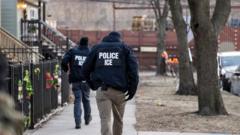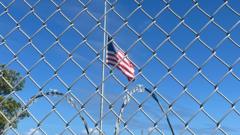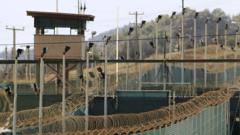The U.S. Court of Appeals for the District of Columbia has overturned a plea deal that could have resolved the 9/11 case, allowing the possibility of revisited death penalty trials at Guantánamo Bay, following Secretary of Defense Lloyd Austin's declaration of the agreement's invalidity.
Appeals Court Reverses Plea Agreement in 9/11 Mastermind Case

Appeals Court Reverses Plea Agreement in 9/11 Mastermind Case
A recent decision from a federal appeals court reinstates potential death penalty proceedings against Khalid Shaikh Mohammed and co-defendants.
In a significant ruling on July 11, 2025, a federal appeals court overturned a plea deal intended to settle the September 11, 2001, case by imposing life sentences instead of capital punishment. This 2-to-1 decision represents yet another disruption for the families of victims desperately awaiting closure in this protracted legal matter, now re-opening the possibility of a death penalty trial at Guantánamo Bay.
The court's ruling indicates that further appeals may stretch out proceedings, as the new military judge must familiarize themselves with extensive documentation before any trial can commence. Notably, there are lingering issues about the admissibility of confessions garnered, allegedly through torture, that could delay the proceedings even further.
The plea deal was originally negotiated in the summer of 2024 between a senior official within the Pentagon and Khalid Shaikh Mohammed, the alleged mastermind behind the attacks, along with two co-defendants. This agreement was designed to allow the defendants to admit their roles in the attacks in exchange for life sentences, thereby avoiding a capital trial. However, shortly afterward, Defense Secretary Lloyd Austin declared the deal null and void.
The two judges of the U.S. Court of Appeals, Patricia A. Millett and Neomi J. Rao, concluded that Austin possessed the legal authority to withdraw from the agreements since no promises made as part of the deal had been fulfilled. Thus, the case remains in turmoil as the future moves closer to what critics and advocates of justice fear could lead to further legal complications.





















